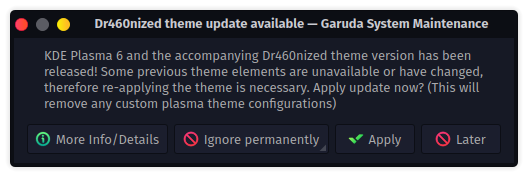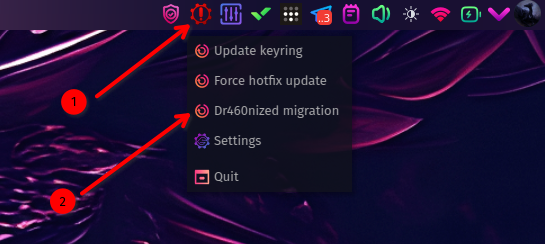Trying to do a system update on my PC. Unfortunately it makes the system completely unusable afterwards. After the update it’s like all UI systems disappear. It thinks no file manager is installed, so I can’t look at files. It thinks no terminal is installed, so I can’t even use that to suss out the issue. I don’t even have any error codes to look up, just a blank desktop and default UI with [?] for the icons. Tried the update a few times, selecting different options, but every time I have to roll back to a snapshot.
It’s also pretty annoying that every other time I do an update I have to reassemble my theme and layout configs. Reset widgets. Etc. Is this normal or am I experiencing edge cases, or doing a common practice wrong?
garuda-inxi
System:
Kernel: 6.6.4-zen1-1-zen arch: x86_64 bits: 64 compiler: gcc v: 13.2.1
clocksource: tsc available: hpet,acpi_pm
parameters: BOOT_IMAGE=/@/boot/vmlinuz-linux-zen
root=UUID=c29fb1d5-8388-4db2-b4c7-71dde32885c3 rw rootflags=subvol=@
quiet quiet rd.udev.log_priority=3 vt.global_cursor_default=0 loglevel=3
ibt=off
Desktop: KDE Plasma v: 5.27.10 tk: Qt v: 5.15.11 wm: kwin_x11 vt: 2
dm: SDDM Distro: Garuda Linux base: Arch Linux
Machine:
Type: Desktop Mobo: Micro-Star model: MPG B550 GAMING EDGE WIFI (MS-7C91)
v: 1.0 serial: <superuser required> UEFI: American Megatrends LLC. v: 1.B0
date: 08/30/2022
CPU:
Info: model: AMD Ryzen 7 5800X bits: 64 type: MT MCP arch: Zen 3+ gen: 4
level: v3 note: check built: 2022 process: TSMC n6 (7nm) family: 0x19 (25)
model-id: 0x21 (33) stepping: 0 microcode: 0xA201016
Topology: cpus: 1x cores: 8 tpc: 2 threads: 16 smt: enabled cache:
L1: 512 KiB desc: d-8x32 KiB; i-8x32 KiB L2: 4 MiB desc: 8x512 KiB
L3: 32 MiB desc: 1x32 MiB
Speed (MHz): avg: 3716 high: 3800 min/max: 2200/4850 boost: enabled
scaling: driver: acpi-cpufreq governor: performance cores: 1: 3596 2: 3800
3: 3596 4: 3800 5: 3800 6: 3800 7: 3596 8: 3602 9: 3610 10: 3800 11: 3660
12: 3800 13: 3800 14: 3800 15: 3800 16: 3598 bogomips: 121593
Flags: avx avx2 ht lm nx pae sse sse2 sse3 sse4_1 sse4_2 sse4a ssse3 svm
Vulnerabilities: <filter>
Graphics:
Device-1: AMD Navi 23 [Radeon RX 6600/6600 XT/6600M] vendor: Gigabyte
driver: amdgpu v: kernel arch: RDNA-2 code: Navi-2x process: TSMC n7 (7nm)
built: 2020-22 pcie: gen: 4 speed: 16 GT/s lanes: 16 ports:
active: DP-1,HDMI-A-2 empty: DP-2,HDMI-A-1 bus-ID: 2d:00.0
chip-ID: 1002:73ff class-ID: 0300
Display: x11 server: X.Org v: 21.1.9 with: Xwayland v: 23.2.2
compositor: kwin_x11 driver: X: loaded: amdgpu unloaded: modesetting,radeon
alternate: fbdev,vesa dri: radeonsi gpu: amdgpu display-ID: :0 screens: 1
Screen-1: 0 s-res: 4480x1440 s-dpi: 96 s-size: 1184x380mm (46.61x14.96")
s-diag: 1243mm (48.96")
Monitor-1: DP-1 mapped: DisplayPort-0 pos: primary,left model: ASUS VG289
serial: <filter> built: 2023 res: 2560x1440 hz: 60 dpi: 105 gamma: 1.2
size: 621x341mm (24.45x13.43") diag: 708mm (27.9") ratio: 16:9 modes:
max: 3840x2160 min: 640x480
Monitor-2: HDMI-A-2 mapped: HDMI-A-1 pos: right
model: LG (GoldStar) FULL HD built: 2014 res: 1920x1080 hz: 60 dpi: 102
gamma: 1.2 size: 480x270mm (18.9x10.63") diag: 551mm (21.7") ratio: 16:9
modes: max: 1920x1080 min: 720x400
API: EGL v: 1.5 hw: drv: amd radeonsi platforms: device: 0 drv: radeonsi
device: 1 drv: swrast surfaceless: drv: radeonsi x11: drv: radeonsi
inactive: gbm,wayland
API: OpenGL v: 4.6 compat-v: 4.5 vendor: amd mesa v: 23.2.1-arch1.2
glx-v: 1.4 direct-render: yes renderer: AMD Radeon RX 6600 XT (navi23 LLVM
16.0.6 DRM 3.54 6.6.4-zen1-1-zen) device-ID: 1002:73ff memory: 7.81 GiB
unified: no
API: Vulkan v: 1.3.269 layers: 9 device: 0 type: discrete-gpu name: AMD
Radeon RX 6600 XT (RADV NAVI23) driver: mesa radv v: 23.2.1-arch1.2
device-ID: 1002:73ff surfaces: xcb,xlib device: 1 type: cpu name: llvmpipe
(LLVM 16.0.6 256 bits) driver: mesa llvmpipe v: 23.2.1-arch1.2 (LLVM
16.0.6) device-ID: 10005:0000 surfaces: xcb,xlib
Audio:
Device-1: AMD Navi 21/23 HDMI/DP Audio driver: snd_hda_intel v: kernel pcie:
gen: 4 speed: 16 GT/s lanes: 16 bus-ID: 2d:00.1 chip-ID: 1002:ab28
class-ID: 0403
Device-2: AMD Starship/Matisse HD Audio vendor: Micro-Star MSI
driver: snd_hda_intel v: kernel pcie: gen: 4 speed: 16 GT/s lanes: 16
bus-ID: 2f:00.4 chip-ID: 1022:1487 class-ID: 0403
Device-3: Logitech Blue Microphones
driver: hid-generic,snd-usb-audio,usbhid type: USB rev: 2.0 speed: 480 Mb/s
lanes: 1 mode: 2.0 bus-ID: 1-5:5 chip-ID: 046d:0ab7 class-ID: 0300
serial: <filter>
API: ALSA v: k6.6.4-zen1-1-zen status: kernel-api with: aoss
type: oss-emulator tools: N/A
Server-1: PipeWire v: 1.0.0 status: active with: 1: pipewire-pulse
status: active 2: wireplumber status: active 3: pipewire-alsa type: plugin
4: pw-jack type: plugin tools: pactl,pw-cat,pw-cli,wpctl
Network:
Device-1: Intel Wi-Fi 6 AX210/AX211/AX411 160MHz driver: iwlwifi v: kernel
pcie: gen: 2 speed: 5 GT/s lanes: 1 bus-ID: 29:00.0 chip-ID: 8086:2725
class-ID: 0280
IF: wlo1 state: down mac: <filter>
Device-2: Realtek RTL8125 2.5GbE vendor: Micro-Star MSI driver: r8169
v: kernel pcie: gen: 2 speed: 5 GT/s lanes: 1 port: f000 bus-ID: 2a:00.0
chip-ID: 10ec:8125 class-ID: 0200
IF: enp42s0 state: up speed: 1000 Mbps duplex: full mac: <filter>
Bluetooth:
Device-1: Intel AX210 Bluetooth driver: btusb v: 0.8 type: USB rev: 2.0
speed: 12 Mb/s lanes: 1 mode: 1.1 bus-ID: 1-9:7 chip-ID: 8087:0032
class-ID: e001
Report: btmgmt ID: hci0 rfk-id: 1 state: up address: <filter> bt-v: 5.3
lmp-v: 12 status: discoverable: no pairing: no class-ID: 7c0104
Drives:
Local Storage: total: 2.61 TiB used: 844.85 GiB (31.6%)
SMART Message: Unable to run smartctl. Root privileges required.
ID-1: /dev/nvme0n1 maj-min: 259:0 vendor: Western Digital
model: WD BLACK SN770 1TB size: 931.51 GiB block-size: physical: 512 B
logical: 512 B speed: 63.2 Gb/s lanes: 4 tech: SSD serial: <filter>
fw-rev: 731030WD temp: 35.9 C scheme: GPT
ID-2: /dev/sda maj-min: 8:0 vendor: Western Digital
model: WDS100T2B0A-00SM50 size: 931.51 GiB block-size: physical: 512 B
logical: 512 B speed: 6.0 Gb/s tech: SSD serial: <filter> fw-rev: 00WD
scheme: GPT
ID-3: /dev/sdb maj-min: 8:16 vendor: Western Digital
model: WD7500BPKX-80HPJT0 size: 698.64 GiB block-size: physical: 4096 B
logical: 512 B speed: 6.0 Gb/s tech: HDD rpm: 7200 serial: <filter>
fw-rev: 1A01 scheme: GPT
ID-4: /dev/sdc maj-min: 8:32 vendor: Kingston model: DataTraveler 70
size: 57.62 GiB block-size: physical: 512 B logical: 512 B type: USB
rev: 3.2 spd: 5 Gb/s lanes: 1 mode: 3.2 gen-1x1 tech: N/A serial: <filter>
scheme: MBR
SMART Message: Unknown USB bridge. Flash drive/Unsupported enclosure?
ID-5: /dev/sdd maj-min: 8:48 vendor: Kingston model: DataTraveler 3.0
size: 57.73 GiB block-size: physical: 512 B logical: 512 B type: USB
rev: 2.1 spd: 480 Mb/s lanes: 1 mode: 2.0 tech: N/A serial: <filter>
fw-rev: 0000 scheme: GPT
SMART Message: Unknown USB bridge. Flash drive/Unsupported enclosure?
Partition:
ID-1: / raw-size: 931.22 GiB size: 931.22 GiB (100.00%)
used: 844.85 GiB (90.7%) fs: btrfs dev: /dev/nvme0n1p2 maj-min: 259:2
ID-2: /boot/efi raw-size: 300 MiB size: 299.4 MiB (99.80%)
used: 584 KiB (0.2%) fs: vfat dev: /dev/nvme0n1p1 maj-min: 259:1
ID-3: /home raw-size: 931.22 GiB size: 931.22 GiB (100.00%)
used: 844.85 GiB (90.7%) fs: btrfs dev: /dev/nvme0n1p2 maj-min: 259:2
ID-4: /var/log raw-size: 931.22 GiB size: 931.22 GiB (100.00%)
used: 844.85 GiB (90.7%) fs: btrfs dev: /dev/nvme0n1p2 maj-min: 259:2
ID-5: /var/tmp raw-size: 931.22 GiB size: 931.22 GiB (100.00%)
used: 844.85 GiB (90.7%) fs: btrfs dev: /dev/nvme0n1p2 maj-min: 259:2
Swap:
Kernel: swappiness: 133 (default 60) cache-pressure: 100 (default) zswap: no
ID-1: swap-1 type: zram size: 31.26 GiB used: 29.8 MiB (0.1%)
priority: 100 comp: zstd avail: lzo,lzo-rle,lz4,lz4hc,842 max-streams: 16
dev: /dev/zram0
Sensors:
System Temperatures: cpu: 41.4 C mobo: N/A gpu: amdgpu temp: 33.0 C
mem: 28.0 C
Fan Speeds (rpm): N/A gpu: amdgpu fan: 0
Info:
Processes: 369 Uptime: 14m wakeups: 0 Memory: total: 32 GiB
available: 31.27 GiB used: 3.27 GiB (10.5%) Init: systemd v: 254
default: graphical tool: systemctl Compilers: gcc: 13.2.1 clang: 16.0.6
Packages: 2220 pm: pacman pkgs: 2214 libs: 589 tools: octopi,paru
pm: flatpak pkgs: 6 Shell: fish v: 3.6.2 default: Bash v: 5.2.21
running-in: konsole inxi: 3.3.31
Garuda (2.6.19-2):
System install date: 2022-10-09
Last full system update: 2023-12-06
Is partially upgraded: Yes
Relevant software: snapper NetworkManager mkinitcpio
Windows dual boot: Probably (Run as root to verify)
Failed units:

